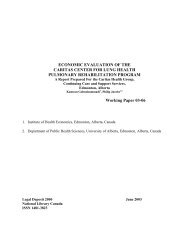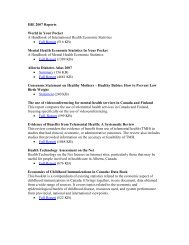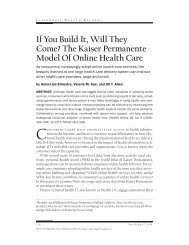Bariatric treatments for adult obesity - Institute of Health Economics
Bariatric treatments for adult obesity - Institute of Health Economics
Bariatric treatments for adult obesity - Institute of Health Economics
- No tags were found...
You also want an ePaper? Increase the reach of your titles
YUMPU automatically turns print PDFs into web optimized ePapers that Google loves.
Since the evolvement <strong>of</strong> behavioural principles <strong>for</strong> <strong>obesity</strong> treatment during the late 1960s and early1970s, behavioural treatment strategies have developed significantly in terms <strong>of</strong> improved cognitiveprocedures <strong>for</strong> relapse prevention training and correction <strong>of</strong> negative thinking. 5 The addition <strong>of</strong> suchcognitive procedures has led to the renaming <strong>of</strong> behavioural treatment as “cognitive-behaviouraltherapy.” Currently, typical behavioural therapies in the treatment <strong>of</strong> <strong>obesity</strong> include cognitivebehavioural therapy strategies. 5Behavioural therapy works primarily by enhancing dietary restraint through provision <strong>of</strong> adaptivedietary strategies and discouragement <strong>of</strong> maladaptive dietary practices, and by increasing motivationto be more physically active. 15 Cognitive behavioural therapy aims at identifying and modifyingaversive thinking patterns and mood states in order to facilitate weight loss. 15Table T.2: Behavioural modification strategiesSelf-monitoringKeeping an extended food and exercise diary to give insights into personal behaviours and to bring unrecognizedbehaviours to lightStress managementDeveloping coping strategies and meditation and relaxation techniquesStimulus controlLearning to shop carefully <strong>for</strong> healthy foods, keeping high-calorie foods out <strong>of</strong> the house, limiting the times andplaces <strong>of</strong> eating, and consciously avoiding situations in which overeating occursProblem solvingIdentifying problems choosing solutions planning and implementing evaluating the outcomeContingency managementRewarding changes in behaviorCognitive restructuringModifying negative thoughts, unrealistic goals, and inaccurate beliefs about weight loss, and preparing in advance <strong>for</strong>relapsesSocial supportDeveloping a network <strong>of</strong> family members, friends, or colleagues who can assist in maintaining motivation andproviding positive rein<strong>for</strong>cementRelapse prevention trainingDeveloping the skills to overcome setbacks and to cope with problemsSource: Lang & Froelicher 2006 5PharmacotherapyDefinitionAnti<strong>obesity</strong> medications can reduce energy intake by decreasing the appetite or increasing satiety;reduce the absorption <strong>of</strong> nutrients; or increase energy expenditure. 16 Current available medicationswork through two mechanisms: (1) monoamines in the central nervous system, or (2) blockade <strong>of</strong>lipase digestion in the intestine 17 Pharmacotherapy <strong>for</strong> <strong>obesity</strong> should be regarded as an adjunct todietary restriction, physical exercise, and behavioural therapy. 18,19TypeApproved anti<strong>obesity</strong> medications can be divided into three broad categories:<strong>Bariatric</strong> <strong>treatments</strong> <strong>for</strong> <strong>adult</strong> <strong>obesity</strong> 67
















